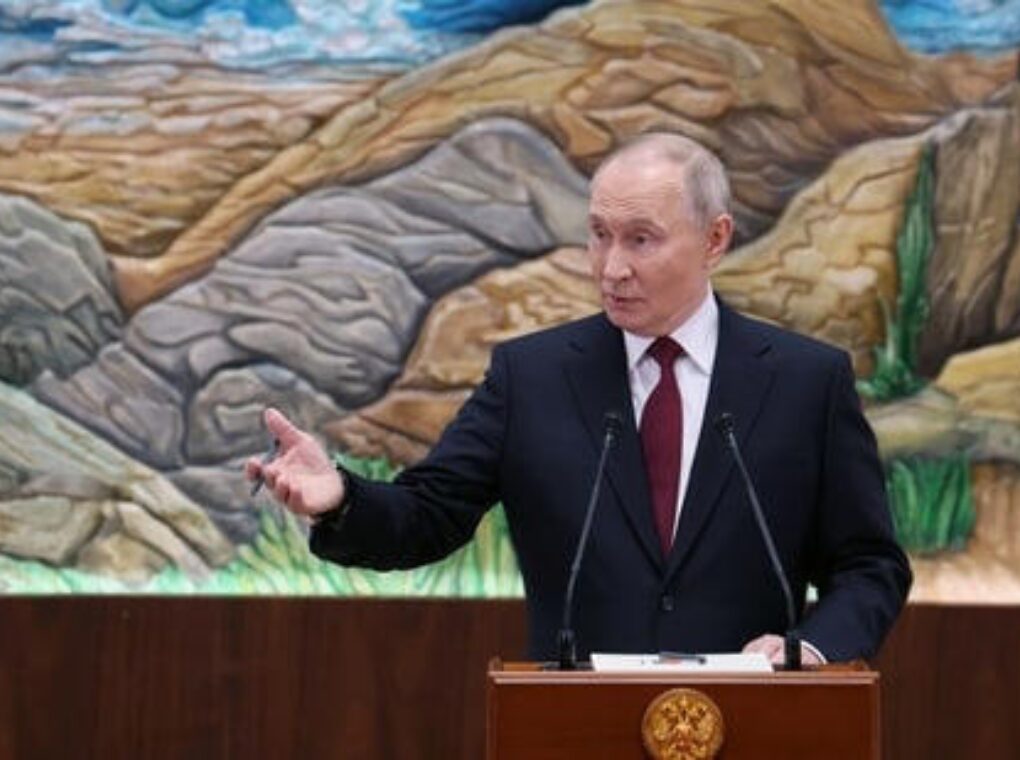Russian President Vladimir Putin on Thursday outlined sharp new conditions for ending Moscow’s ongoing offensive in Ukraine, insisting that Russia would halt military operations only if Ukrainian forces withdrew from territories the Kremlin claims as its own. The remarks, delivered during his visit to Kyrgyzstan, come at a time when multiple Western capitals are once again calling for a negotiated end to the nearly four-year-long war.
“If Ukrainian forces leave the territories they hold, then we will stop combat operations,” Putin said. “If they don’t, then we will achieve it by military means.”
Russia currently controls close to one-fifth of Ukraine’s internationally recognized territory, and fighting remains intense in the eastern regions.
Territory at the Center of Peace Debate
The Russian president’s latest remarks underscore the central sticking point that has stalled all peace efforts so far: land. Moscow’s demand that Ukraine cede territory—something Kyiv has repeatedly and categorically rejected—remains the primary obstacle to any progress.
Putin’s statement coincides with renewed Western pressure on Kyiv and Moscow to return to the negotiating table. The United States and several European nations have signaled interest in exploring diplomatic paths to end the war, especially as Ukraine faces worsening battlefield conditions and ammunition shortages. However, Ukrainian President Volodymyr Zelenskyy has declared that no government in Kyiv has the authority to surrender sovereign Ukrainian territory.
Questioning Kyiv’s Legitimacy
In addition to territorial demands, Putin escalated his rhetoric against Ukraine’s leadership. He argued that signing any agreement with Zelenskyy’s government would be “senseless,” claiming that Ukraine’s leadership lost legitimacy after declining to hold presidential elections once martial law was imposed.
Ukraine has repeatedly responded that elections are constitutionally prohibited during wartime, and with millions displaced, active frontlines, and Russian missile strikes ongoing, holding a nationwide vote would be impossible.
Putin’s narrative appears designed to weaken Kyiv’s international recognition and raise doubts over any future commitments made by its government.
Claims of Major Battlefield Gains
Putin also used the Kyrgyzstan appearance to highlight what he said were significant Russian advances. According to him, Russian troops have encircled Ukrainian forces in the contested cities of Pokrovsk and Myrnograd in the eastern Donetsk region. Moscow refers to these cities by their Soviet-era names—Krasnoarmeysk and Dimitrov.
“Krasnoarmeysk and Dimitrov are completely surrounded,” Putin said, asserting that Russian forces are tightening their grip along the eastern front.
Ukraine has denied the claims, saying its soldiers continue to hold the line and repel Russian assaults. Kyiv’s military officials insist that although Russia has intensified attacks, Ukrainian defensive positions have not collapsed.
Putin additionally claimed advances in Vovchansk, Siversk, and toward the strategic logistical hub of Guliaipole. The Ukrainian military has acknowledged heavy fighting in these sectors but has pushed back against the narrative of rapid Russian breakthroughs.
“Laughable” Claims That Russia Plans to Attack Europe
Addressing broader geopolitical fears, Putin dismissed Western statements suggesting that Russia could expand military operations beyond Ukraine. He called such warnings “laughable” and accused European leaders of deliberately scaring their own populations.
“It’s a total lie,” Putin said. “There are crooks telling this to people to increase their ratings and to serve the military industry’s interests.”
This comment appears aimed particularly at NATO member states that have repeatedly warned their citizens to prepare for potential escalations. Countries like Germany, Poland, and the Baltic states have significantly boosted military budgets, citing a long-term threat from Moscow.
Putin has attempted to counter this narrative by positioning Russia as unwilling to engage in direct warfare with Europe—though Western officials point out that Moscow made similar assurances about Ukraine prior to the 2022 invasion.
War Entering a Critical Phase
Russia’s full-scale invasion of Ukraine in February 2022 triggered the gravest conflict in Europe since World War II. Over the years, the war has evolved into a grinding, attritional struggle, with Ukraine now facing manpower shortages and dwindling Western military support.
As Moscow continues advancing and the West searches for a diplomatic formula, Putin’s latest conditions highlight that the Kremlin feels militarily confident and politically emboldened. Yet they also reinforce the deep impasse between the two sides—one insisting on reclaiming every inch of territory, the other insisting on keeping what it has seized.
With both Kyiv and Moscow unwilling to compromise on core issues, the prospect of immediate peace remains distant. For now, the war continues with no end in sight, even as global pressure intensifies and domestic pressures mount on both sides.
